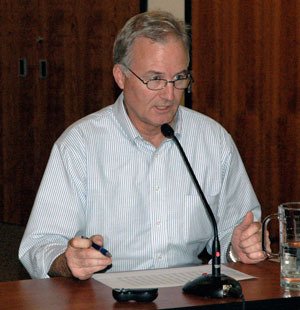ARLINGTON — The Arlington City Council will be conducting a public hearing on its revenue sources on Monday, Oct. 21, in the wake of its Oct. 14 workshop meeting which discussed setting the 2014 property tax levy.
City of Arlington Finance Director Jim Chase reported on Monday, Oct. 14, that the city of Arlington’s general and EMS levies are being impacted by fluctuating property values, since the Snohomish County Assessor’s Office has determined the assessed value of property within the Arlington city limits has increased in value by approximately 4.5 percent. This would lower the general property tax levy rate from $1.42 to $1.38 per $1,000 of assessed valuation, while the EMS levy, which is currently at the maximum rate of 50 cents per $1,000 of assessed valuation, would decrease to approximately 48.4 cents per $1,000 of assessed valuation.
“The 2013 property tax levy is $2,453,331, and a tax increase of the maximum allowable 1 percent would add up to $24,533,” Chase said. “The assessed valuation of new construction was $17,220,300, and at the 2013 property tax rate of $1.42 per $1,000 of assessed value, that yields $24,450. So, when coupled with taxes on the assessed valuation of new construction — plus taxes from annexations, increases in state-assessed utility values, and allowed refunds — the general levy for 2014 can be set at approximately $2,502,314.”
Chase then cited a letter from the Assessor’s Office, stating that Arlington’s banked capacity for the EMS levy is $47,318. Arlington would not be able to use all of that banked capacity in 2014, but the City Council could vote by a super-majority to take an estimated $28,840 of that banked capacity, which would restore the levy’s maximum rate of 50 cents per $1,000 of assessed valuation. Through another resolution, the Council could then elect to either bank or reserve the right to use the remaining $18,478 in the future.
“We are allowed by law to be able to collect up to the highest lawful levy amount which has created some banked capacity,” said Chase said, who explained that this banked capacity resulted from the decrease in tax the city was allowed to collect in 2013, versus its highest levy amount in 2012. “This automatically created banked capacity.”
Looking to other revenue sources, Chase identified a gradual but steady trend of increasing sales tax revenues since 2010, following a dramatic crash after their peak in 2007. Aside from slight dips in 2007 and 2011, the city’s utility tax revenues have experienced continual growth since 2005. Chase forecast a plateau in building permits between 2013 and 2014, following a cratering in those revenues in 2009 and 2010, and a dip downward from a resurgence in 2012.
The Arlington City Council is required, following a public hearing on the subject, to set an annual property tax levy by Nov. 30 of each year. The public hearing has been scheduled for Oct. 21, as required by law. City staff have requested that the City Council adopt a resolution setting the levy for 2014 at the Oct. 21 Council meeting.







